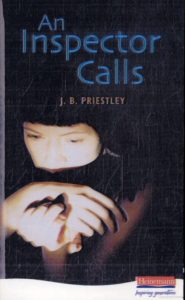Evanescent Tears of A Woman
An Inspector Calls (1945) and Freedom
By Esra Çan and Doğacan Şirin

B. Priestley’s play An Inspector Calls (1945) is a detective thriller, which stages an inspector’s investigation of young Eva Smith’s suicide by interrogating Birlings, an upper-class family whose members had impacts on Eva’s life one way or the other. The play allows the reader to reevaluate the gray areas around morality by displaying multiple cases of invasion of privacy and limitation of freedom. To reveal the mystery surrounding Eva’s death, Inspector Goole invades family’s privacy by showing up unannounced at the time of Birlings’ celebration of their daughter Sheila’s engagement to Gerald Croft. The series of misfortunes Eva had to go through starts with Arthur Birling, father and business-man, firing Eva after she stands up for her right to get a raise and starts a strike at the workplace when her request was denied. Eva then gets a job at a boutique where Sybil and Sheila visit often. Sheila believes Eva laughs at her when Sheila tries on an unfitting dress and asks Eva to put it on instead with the purpose of humiliating her. When the dress suits Eva better, Sheila gets her fired out of jealousy. Eva gets desperate to find a job afterwards and starts working as a bargirl where she gets harassed by one of the customers. Getting oppressed by the upper-class and faced with misogyny, she loses her freedom to choose a suitable occupation for herself.
During the investigation, Eva’s entire personal life and affairs come out in the open to the people who she barely knows and only had negative impacts that led to her suicide. It is emphasized that she wanted to protect her privacy when she asked for help from a women’s charity organization and lied about her name, using the Birling name instead. These two acts create a moral dilemma since it is a breach of personal data to use someone else’s name, although Eva’s motivation is to protect her own privacy. Sybil reacts very aggressively to seeing her name used falsely and refuses to help Eva, who is pregnant by Sybil’s son Eric at the time. After losing three jobs in a row and carrying an illegitimate child whose father is not entitled to support her, her rejection by Sybil becomes the breaking-point. Eva’s basic needs to maintain an adequate life is neglected and her wish to associate herself with an organization, whose main goal is in fact helping women in need, is unfulfilled. She loses the last hope of providing for her child, founding a family and finding protection within a community of her choice.
B. Priestley creates a scenario to help readers refine their understanding of freedom by displaying subtle implications that result from violations of freedom and especially the right to privacy. The consequences of repeated violations that cost a life are strongly underlined through Inspector playing the role of conscience and Eva representing each individual stuck in gray areas in morality.
